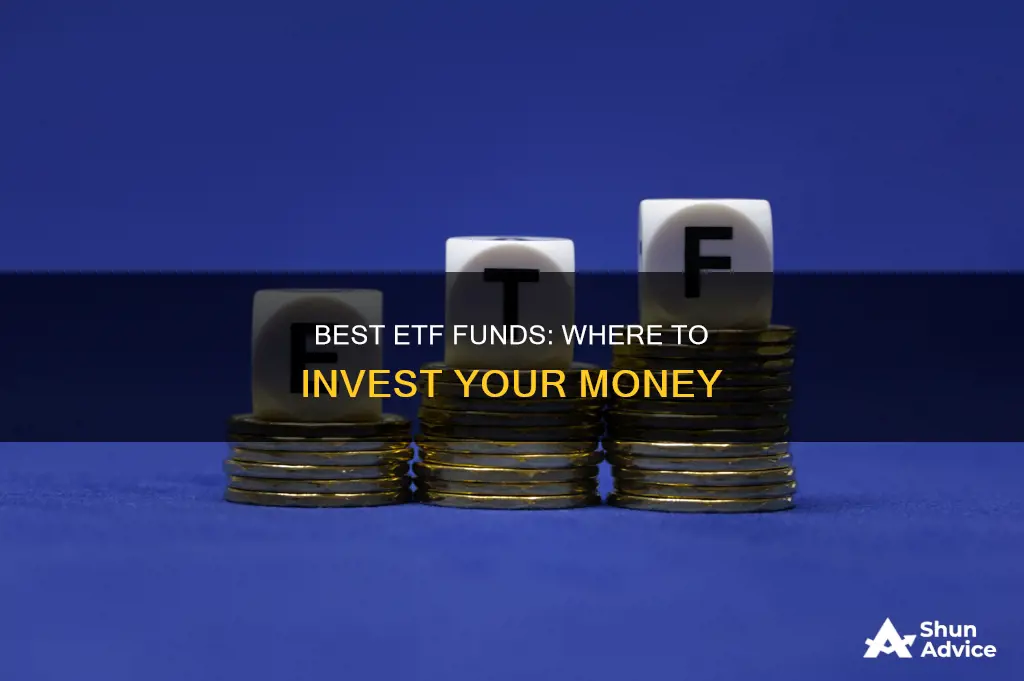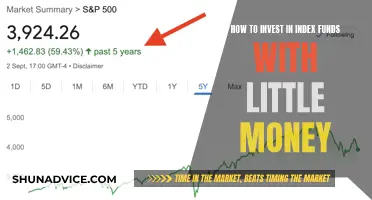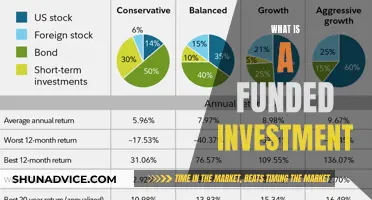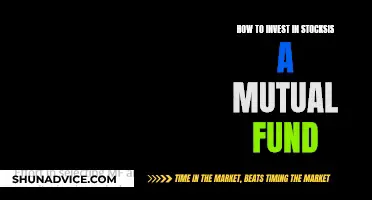
Exchange-traded funds (ETFs) are a great way to invest in a diverse range of stocks, especially for beginners. They are a collection of stocks or other assets that can be bought and sold on an exchange like a regular stock, but with lower expenses. ETFs are a good investment because they are low-cost, diversified, and have solid returns.
ETFs can be based on a preset basket of stocks, or an index, like the S&P 500 or Nasdaq-100. They can also be based on specific sectors, such as technology or banking, or focus on international markets like China or emerging markets.
Some of the best ETFs to invest in include the Vanguard S&P 500 ETF, Invesco QQQ Trust, and iShares Core Dividend Growth ETF. These ETFs have low expense ratios, strong historical performance, and instant diversification, making them a good choice for investors looking for a simple way to invest in the stock market.
What You'll Learn

Best broad-market ETFs
Broad-market ETFs are a great way to invest in the stock market without having to pick individual stocks. They are also a good option for beginners as they are relatively inexpensive and tend to be less risky than investing in individual stocks. Here are some of the best broad-market ETFs to consider:
Vanguard S&P 500 ETF (VOO)
The Vanguard S&P 500 ETF is one of the largest and most popular ETFs, with hundreds of billions in assets under management. It tracks the S&P 500 index, which consists of 500 large-cap U.S. stocks across all economic sectors and industries. The fund has a low expense ratio of 0.03%, which means you'll pay only $3 annually for every $10,000 invested. The ETF has delivered a solid 16.0% five-year annualized return.
SPDR S&P 500 ETF Trust (SPY)
The SPDR S&P 500 ETF is one of the oldest ETFs, having been founded in 1993. It tracks the S&P 500 index and is sponsored by State Street Global Advisors. The fund has hundreds of billions in assets under management and an expense ratio of 0.095%, which means you'll pay $9.50 annually for every $10,000 invested. It has delivered a 15.9% five-year annualized return.
IShares Core S&P 500 ETF (IVV)
The iShares Core S&P 500 ETF is sponsored by BlackRock, one of the largest fund companies. This ETF also tracks the S&P 500 index and has been around since 2000. It has an expense ratio of 0.03%, which means you'll pay $3 annually for every $10,000 invested. The fund has delivered a solid 16.0% five-year annualized return.
Schwab S&P 500 Index Fund (SWPPX)
The Schwab S&P 500 Index Fund is sponsored by Charles Schwab and has tens of billions in assets under management. This mutual fund has a strong track record dating back to 1997 and a very low expense ratio of 0.02%, which means you'll pay only $2 annually for every $10,000 invested. It has delivered a 16.0% five-year annualized return.
Invesco QQQ Trust ETF (QQQ)
The Invesco QQQ Trust ETF tracks the performance of the largest non-financial companies in the Nasdaq-100 Index, which has a large weighting in technology shares. The ETF is managed by Invesco and has been around since 1999. It has an expense ratio of 0.20%, which means you'll pay $20 annually for every $10,000 invested. The fund has delivered a strong 21.9% five-year annualized return.
Vanguard Total Stock Market ETF (VTI)
The Vanguard Total Stock Market ETF provides exposure to the entire U.S. stock market, including small, medium, and large companies across all sectors. The fund has been around since 2001 and is sponsored by Vanguard, known for its low-cost funds. It has an expense ratio of 0.03%, which means you'll pay $3 annually for every $10,000 invested. The fund has delivered a 15.2% five-year annualized return.
Mutual Funds vs ULIPs: Where Should You Invest Your Money?
You may want to see also

Best sector-specific ETFs
Sector-specific ETFs allow investors to buy into a specific industry or sector, such as consumer staples, energy, financials, healthcare, or technology. These types of ETFs are typically passive, meaning they track a specific preset index of stocks and simply follow the index mechanically. Here are some of the best sector-specific ETFs to consider:
Vanguard Information Technology ETF (VGT): This ETF provides exposure to the technology sector, which includes companies such as Apple, Microsoft, and Amazon. Vanguard is known for its low-cost investment options, so this ETF is a good choice for investors looking for low fees.
Financial Select Sector SPDR Fund (XLF): This ETF focuses on the financial sector, which includes banks, insurance companies, and other financial institutions. It can provide investors with exposure to a diverse range of financial companies.
Energy Select Sector SPDR Fund (XLE): This ETF gives investors exposure to the energy sector, which includes oil and gas companies, as well as alternative energy companies. It can be a good option for those looking to invest in the energy industry.
Industrial Select Sector SPDR Fund (XLI): This ETF covers the industrial sector, which includes companies involved in industries such as aerospace, defence, construction, and engineering. It can provide investors with exposure to a diverse range of industrial companies.
Vanguard Dividend Appreciation ETF (VIG): This ETF focuses on dividend-paying stocks, which can be attractive to investors looking for regular income. It includes companies with a history of paying dividends and is passively managed, mechanically tracking an index of dividend-paying firms.
Vanguard High Dividend Yield Index ETF (VYM): This ETF also focuses on dividend-paying stocks and is another good option for income-seeking investors. It offers higher returns and low costs, making it a popular choice for retirees or those looking for stable investments.
When considering sector-specific ETFs, it is important to evaluate your financial goals and risk tolerance. These ETFs can provide targeted exposure to specific sectors, but it is crucial to diversify your portfolio to manage risk effectively. Additionally, consider the expense ratios and past performance of the ETFs to make informed investment decisions.
Malabar Value Fund: A Guide to Investing Wisely
You may want to see also

Best international ETFs
International ETFs can provide targeted exposure to international publicly traded companies broadly or by more specific geographic areas, such as Asia, Europe, or emerging markets. Here are some of the best international ETFs to invest in:
Vanguard FTSE Developed Markets ETF (VEA)
VEA is a Vanguard ETF that provides exposure to a wide range of international stocks from developed markets. It has an expense ratio of 0.05%, which is relatively low compared to other ETFs, and has a strong track record of performance.
IShares Core MSCI EAFE ETF (IEFA)
IEFA is an iShares ETF that focuses on developed international markets outside of North America. It has an expense ratio of 0.08% and tracks the MSCI EAFE Index, which includes large and mid-cap stocks from Europe, Australia, Asia, and the Far East.
Vanguard FTSE Emerging Markets ETF (VWO)
VWO is another Vanguard ETF that provides exposure to emerging markets. It has an expense ratio of 0.10% and tracks the FTSE Emerging Index, which includes large, mid, and small-cap stocks from emerging markets.
Vanguard Total International Stock ETF (VXUS)
VXUS is a Vanguard ETF that offers diversified exposure to international stocks from both developed and emerging markets. It has an expense ratio of 0.08% and holds a broad range of stocks from different countries and sectors.
IShares National Muni Bond ETF (MUB)
MUB is an iShares ETF that invests in municipal bonds issued by states and cities. It has an expense ratio of 0.07% and offers tax advantages for residents of the issuing state.
Vanguard Tax-Exempt Bond ETF (VTEB)
VTEB is a Vanguard ETF that focuses on tax-exempt municipal bonds. It has an expense ratio of 0.05% and aims to provide a stable source of income for investors.
These ETFs provide a good mix of exposure to international stocks and bonds, offering diversification and relatively low costs. Remember to always do your research and consult with a financial advisor before investing.
Systematic Transfer Plans: Investing in Volatile Markets with Mutual Funds
You may want to see also

Best dividend ETFs
Dividend-paying stocks have proven to be a dependable source of wealth creation since the early 1900s. Dividend-focused ETFs provide an efficient way to access dividend-growth strategies with minimal effort. Here are some of the best dividend ETFs in the market:
Vanguard Dividend Appreciation ETF (VIG)
VIG tracks the performance of the NASDAQ US Dividend Achievers Select Index, focusing on companies that have consistently increased dividend payments for at least a decade. It has a fund dividend yield of 1.7%, an expense ratio of 0.06%, and assets under management of around $86.6 billion.
Vanguard High Dividend Yield ETF (VYM)
VYM tracks the FTSE High Dividend Yield Index, selecting high-yield dividend-paying companies based in the US. It has a fund dividend yield of 2.8%, an expense ratio of 0.06%, and assets under management of about $59.4 billion.
Schwab US Dividend Equity ETF (SCHD)
SCHD tracks the Dow Jones US Dividend 100 Index, selecting companies with strong financial performance and a proven track record of reliable dividend distributions. It has a fund dividend yield of 3.5%, an expense ratio of 0.06%, and assets under management of approximately $63.4 billion.
SPDR S&P Dividend ETF (SDY)
SDY tracks the performance of the S&P High Yield Dividend Aristocrats Index, screening for companies that have consistently increased dividend payments for at least 20 consecutive years. It has a fund dividend yield of 2.3%, an expense ratio of 0.35%, and assets under management of around $21.7 billion.
IShares Select Dividend ETF (DVY)
DVY tracks the performance of the Dow Jones Select Dividend Index, selecting about 100 high-dividend yield companies based in the US. It has a fund dividend yield of 3.5%, an expense ratio of 0.38%, and assets under management of approximately $20.3 billion.
ProShares S&P 500 Dividend Aristocrats ETF (NOBL)
NOBL tracks the performance of the S&P 500 Dividend Aristocrats Index, screening for multinational companies with a history of increasing dividends for at least 25 consecutive years. It has a fund dividend yield of 2.0%, an expense ratio of 0.35%, and assets under management of about $12.7 billion.
IShares Core Dividend Growth ETF (DGRO)
DGRO focuses on companies with sustainable dividend growth and has a low expense ratio of 0.08%. Its top holdings include established market leaders like ExxonMobil, Microsoft, Apple, and JPMorgan Chase. It has an annualized yield of 2.2% and has delivered a total return of 216% over the past 10 years.
Vanguard High Dividend Yield ETF (VYM)
VYM targets companies paying above-average dividends relative to the broader US market. It has an expense ratio of 0.06%, making it cost-effective. Its yield typically exceeds that of the S&P 500, and it currently offers a yield of 2.83%, more than double the average yield of the benchmark S&P 500.
Schwab US Dividend Equity ETF (SCHD)
SCHD combines rigorous quality screening with dividend-growth potential. It has an attractive yield of 3.47% and a competitive expense ratio of 0.06%, making it one of the most cost-efficient options in the high-dividend yield ETF space. Its top holdings include blue-chip dividend payers like The Home Depot, Verizon Communications, and Cisco Systems.
Convince Your Family to Invest in Hedge Funds
You may want to see also

Best bond ETFs
Bond ETFs are highly versatile and can be used for speculation, income, or protection. They are also a great way for investors to get exposure to bonds. Here are some of the best bond ETFs to invest in:
Vanguard Total Bond Market ETF (BND)
This ETF is a "Goldilocks" one-size-fits-all bond ETF that tracks the Bloomberg US Aggregate Float Adjusted Index. It has over 11,000 treasuries, mortgage-backed securities, and investment-grade corporate bonds, and a minimal expense ratio of 0.03%.
Vanguard Short-Term Bond Index Fund ETF (BSV)
BSV is a short-term bond ETF with an average duration of 2.6 years and a yield to maturity of 4.4%. It offers a compelling yield and will perform well while short-term rates remain high, even if the Federal Reserve reduces overnight rates.
Vanguard Intermediate-Term Bond ETF (BIV)
BIV is an intermediate-term bond ETF that invests in bonds with maturities between three and ten years. It offers a balance between risk and return and is suitable for investors with a medium-term horizon. It has an average duration of 6.2 years and a 4.5% yield to maturity.
Vanguard Long-Term Bond ETF (BLV)
BLV is a long-term bond ETF that invests in bonds with maturities of more than ten years. It has a longer duration and is more sensitive to interest rate changes, making it suitable for investors with a long-term investment horizon and a higher risk tolerance. It has a duration of 13.7 years and a 5% yield to maturity.
IShares MBS ETF (MBB)
MBB is a mortgage-backed securities ETF with high credit quality and monthly cash flows. It has a yield to maturity of 4.5% and most of its holdings are rated "AA". It is also affordable, with a 0.04% expense ratio.
IShares 0-3 Month Treasury Bond ETF (SGOV)
SGOV focuses on Treasury bills with less than three months to maturity, providing excellent safety and liquidity. It has a very low 30-day median bid-ask spread of just 0.01%.
IShares Broad USD Investment Grade Corporate Bond ETF (USIG)
USIG holds over 10,000 investment-grade corporate bonds while maintaining a narrow 30-day bid-ask spread of 0.02%. It has a 4.8% yield to maturity and an average duration of 6.8 years.
SPDR Bloomberg High Yield Bond ETF (JNK)
JNK is a high-yield bond ETF that invests in bonds below the "BBB" credit rating threshold. These securities have a higher risk of default but offer greater yields. It has a narrow 30-day bid-ask spread of 0.01% and a 7.4% yield to maturity.
SPDR Bloomberg Emerging Markets Local Bond ETF (EBND)
EBND invests in foreign-issued government bonds, providing exposure to international bonds without currency conversion. It holds sovereign bonds from countries like South Korea, China, Indonesia, and Brazil, offering a 6.4% yield to maturity and a duration of 6.3 years.
Starting a Collective Investment Fund: Key Steps to Take
You may want to see also
Frequently asked questions
ETFs are a great choice for beginners as they are relatively inexpensive and tend to be less risky than investing in individual stocks. Some of the best ETFs for beginners include the Vanguard S&P 500 ETF, the SPDR S&P 500 ETF Trust, and the iShares Core S&P 500 ETF. These ETFs offer broad market exposure at a low cost, making them ideal for investors who want to participate in the overall growth of the economy.
When it comes to long-term investment, it's important to consider ETFs with strong long-run performance and low expense ratios. The Vanguard S&P 500 ETF, the Vanguard Total Stock Market ETF, and the Invesco QQQ Trust ETF are good options. These ETFs have consistently delivered solid returns over the years and have low expense ratios, making them suitable for long-term investment strategies.
If you're looking for sector-specific ETFs, there are a variety of options available depending on your interests. For example, the iShares Core Dividend Growth ETF focuses on dividend-growing stocks, while the Vanguard Information Technology ETF provides exposure to the technology sector. The iShares U.S. Real Estate ETF and the Vanguard Real Estate ETF are great choices for those interested in the real estate sector. Additionally, the iShares National Muni Bond ETF and the Vanguard Tax-Exempt Bond ETF offer exposure to municipal bonds.







